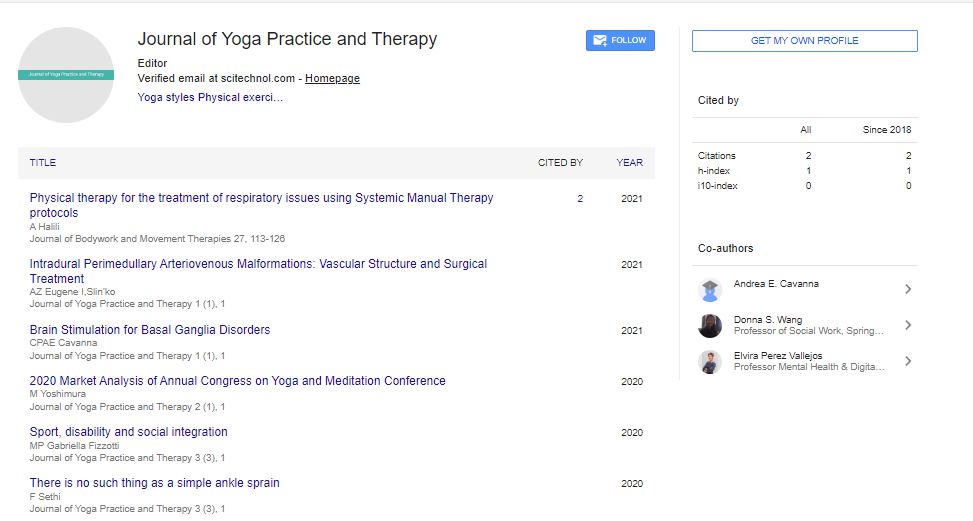Commentary, J Yoga Pract Ther Vol: 6 Issue: 2
Understand the Importance of Yoga and the Spirituality in the Process of Self-Discovery
Sofia Petrovna*
1Department of Yoga and Wellness Promotion, University of Paris, Paris, France
*Corresponding Author: Sofia Petrovna,
Department of Yoga and Wellness
Promotion, University of Paris, Paris, France
E-mail: Sofia.23@gmail.com
Received date: 29 May, 2023, Manuscript No. JYPTY-23-107028;
Editor assigned date: 31 May, 2023, PreQC No. JYPTY-23-107028 (PQ);
Reviewed date: 14 June, 2023, QC No. JYPTY-23-107028;
Revised date: 21 June, 2023, Manuscript No. JYPTY-23-107028 (R);
Published date: 28 June, 2023, DOI: 10.4172/jypty.1000119
Citation: Petrovna S (2023) Understanding the Health Benefits of Exercise from a Scientific Perspective. Int J Yoga Therap 6:2.
Description
Physical exercise has long been recognized as a cornerstone of a healthy lifestyle. From ancient civilizations to modern societies, the importance of staying physically active has been emphasized across cultures. As the scientific understanding of exercise and its effects on the body continues to evolve, it becomes clear that staying physically active is a fundamental aspect of a healthy lifestyle. Incorporating exercise into daily routines can lead to a more fulfilling life and increase overall longevity. Embracing the health benefits of exercise empowers individuals to take control of their well-being and embark on a journey of improved health and vitality.
Health benefits of exercise from a scientific
Scientific studies has delved deeper into the mechanisms behind the health benefits of exercise, uncovering a wealth of evidence that supports its positive impact on overall well-being.
Cardiovascular health: One of the most well-established benefits of exercise is its positive impact on cardiovascular health. Engaging in regular aerobic activities such as running, cycling, or swimming improves heart health by enhancing cardiovascular fitness and reducing the risk of cardiovascular diseases. Exercise strengthens the heart muscles, increasing its efficiency in pumping blood throughout the body. Furthermore, it helps in reducing Low-Density Lipoprotein (LDL) cholesterol levels and increasing High-Density Lipoprotein (HDL) cholesterol levels, promoting better blood circulation and reducing the risk of atherosclerosis.
Weight management: Maintaining a healthy weight is essential for overall health, and exercise plays a vital role in weight management. Physical activities burn calories, aiding in weight loss and preventing weight gain. Combining regular exercise with a balanced diet develops a calorie deficit, leading to sustainable weight loss over time. Moreover, exercise helps build lean muscle mass, which contributes to a higher basal metabolic rate, further supporting weight management efforts.
Bone health: Weight-bearing exercises, such as walking, jogging, and strength training, are instrumental in maintaining bone health. These activities stimulate bone remodeling, encouraging the formation of new bone tissue and strengthening existing bones. Exercise is particularly vital in preventing osteoporosis, a condition characterized by weak and brittle bones, which is more common in older adults. By engaging in regular weight-bearing exercises, individuals can improve bone density and reduce the risk of fractures.
Mental well-being: Beyond its physical benefits, exercise profoundly impacts mental well-being. By doing exercise, the body releases neurotransmitters like endorphins, serotonin, and dopamine, which are natural mood enhancers. These chemicals help reduce stress, anxiety, and symptoms of depression, contributing to improved mental health. Moreover, regular physical activity promotes better sleep patterns, leading to enhanced cognitive function and emotional regulation.
Immune system boost: Scientific studies has shown that exercise positively influences the immune system. Moderate-intensity exercise enhances immune cell function, making the body more effective in fighting off infections and diseases. Regular physical activity has been linked to a reduced risk of chronic inflammatory conditions, as well as an improved response to vaccinations. However, it's essential to strike a balance, as excessive and intense exercise may temporarily suppress the immune system.
Diabetes management: For individuals with type 2 diabetes, exercise plays an important role in glucose control and insulin sensitivity. Physical activities increase glucose uptake in muscles, lowering blood glucose levels and reducing the need for insulin. Furthermore, exercise aids in weight management, which is beneficial for individuals with diabetes as excess weight is a risk factor for the condition.
Conclusion
From cardiovascular health to mental well-being, the scientific evidence supporting the health benefits of exercise is substantial and compelling. Engaging in regular physical activity is essential for maintaining optimal health and reducing the risk of chronic diseases. Cardiovascular exercises improve heart health, weight management activities support healthy body weight, and weight-bearing exercises enhance bone density. Exercise not only contributes to physical wellbeing but also promotes mental well-being by reducing stress and anxiety and improving cognitive function.
 Spanish
Spanish  Chinese
Chinese  Russian
Russian  German
German  French
French  Japanese
Japanese  Portuguese
Portuguese  Hindi
Hindi 